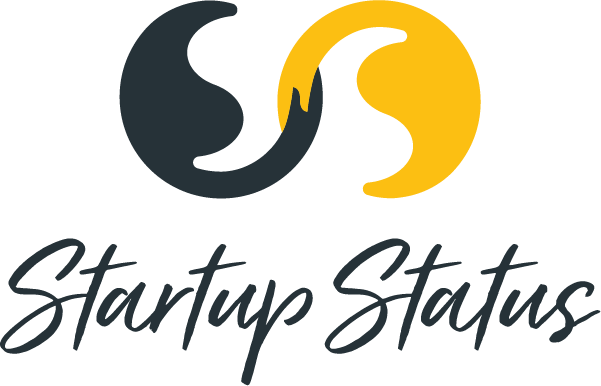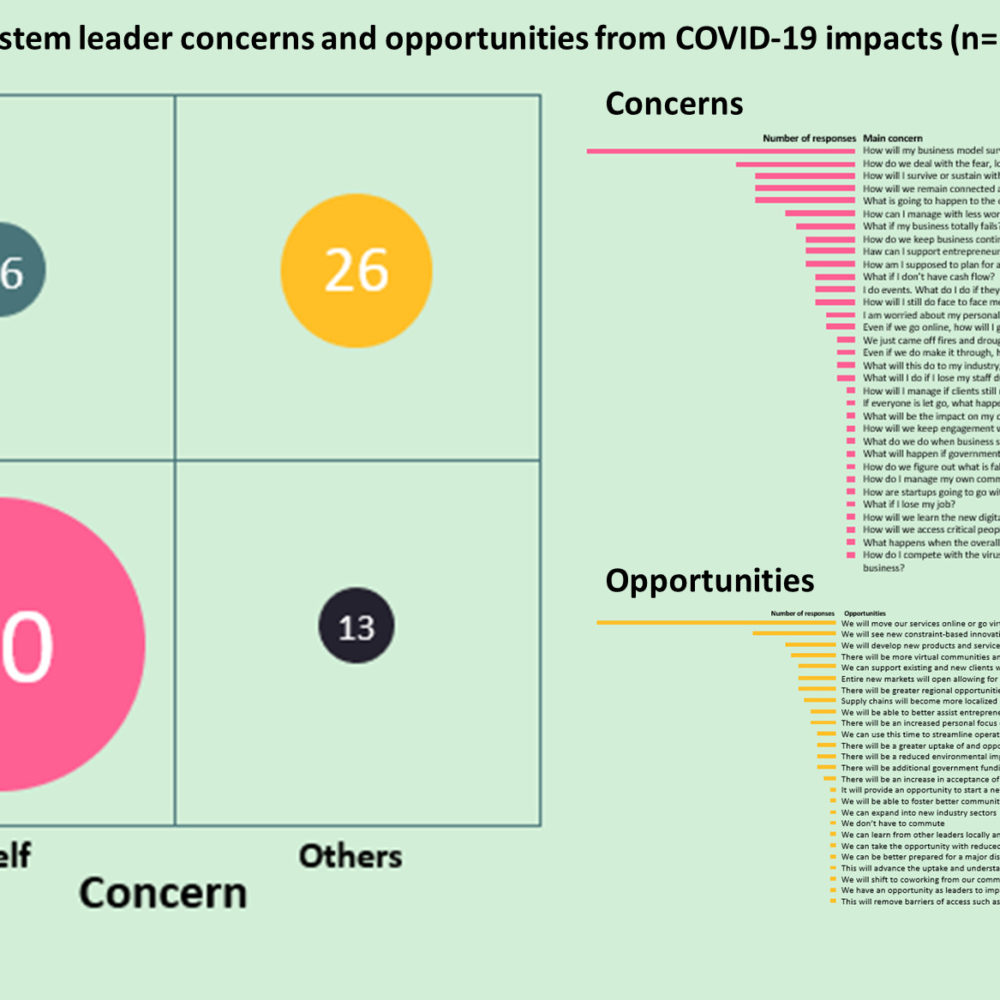Last week we ran a webinar to discuss the coronavirus impacts on leaders in the Australian entrepreneur support community. Around 200 people registered in six hours.
As part of the registration process, we asked leaders two questions:
What do you see as your biggest challenge from impacts related to the coronovirus?
and
What do you see as your biggest opportunity from impacts related to the coronovirus?
We had 108 responses and looked at the results based on three considerations: 1) Focus on self and focus on others; 2) areas of challenge; and 3) areas of opportunity.
Some insights into what was said are below.
Focus on self and focus on others
We examined whether the responses for each concern or opportunity question focused on self (the individual and their organisation), or on others (entrepreneurs, clients, or the wider community at large).
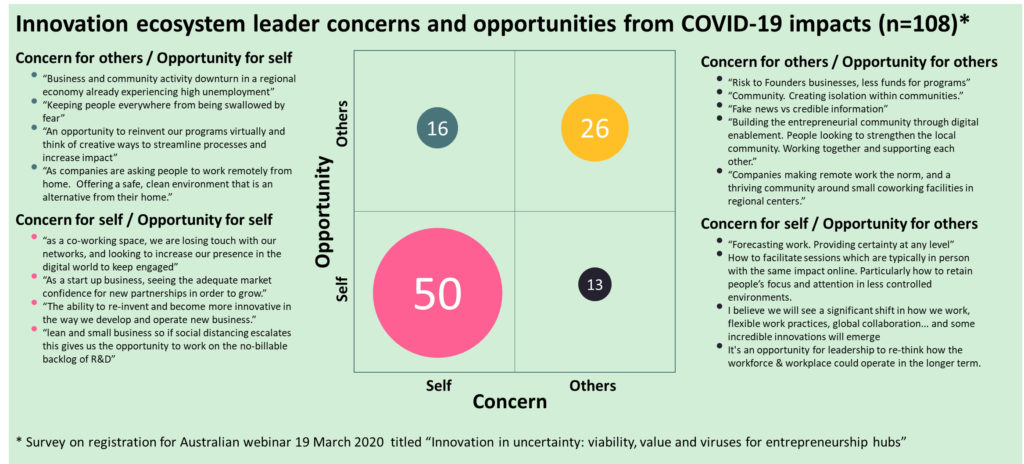
Entrepreneur support organisations come from all walks: spaces and hubs, accelerators and hackathons, economic development organisations and chambers of commerce, universities and tafes, mentors and education programs, service providers and local businesses, governments and corporations, industry bodies and technology communities. All of these can be driven by individuals, corporations, venture capital, universities, the not for profit sector, or government.
Many private entrepreneur support organisations provide economic development support from an altruistic position of wanting to help and give back, similar to a government or university. But this can be a challenging business model at the best of times, much less in the current situation of economic and social impact. Leaders in these organisations balance their desire to give back and support community with the realities of business survival, personal security, and natural concern for the current situation.
It is no surprise then that days into the reality of the situation many of the respondents were considering how the virus impacts affected their business and operations, especially those where their entire business model is changing in front of them.
A concern for self and opportunities for self
A majority of responses – 50 of them – focused on adaptation of the individual business. This is based on the nature of the question explicitly asking about ‘your’ challenges, as well as leaders and business owners navigating an uncertain future. Physical location of coworking and hubs that was essential and celebrated is now rapidly becoming taboo. The dominant thought in these responses was the impacts on the core business model and a transition to online delivery.
- “As a co-working space, we are losing touch with our networks, and looking to increase our presence in the digital world to keep engaged”
- “As a start up business, seeing the adequate market confidence for new partnerships in order to grow.”
- “The ability to re-invent and become more innovative in the way we develop and operate new business.”
- “Lean and small business so if social distancing escalates this gives us the opportunity to work on the no-billable backlog of R&D”
A concern for self and opportunities for others
Some respondents, 13 of them, indicated a concern for self and identified opportunities for others. This aligns with a perspective of a need to be sustainable in order to help others.
- “Forecasting work. Providing certainty at any level”
- “How to facilitate sessions which are typically in person with the same impact online. Particularly how to retain people’s focus and attention in less controlled environments.”
- “I believe we will see a significant shift in how we work, flexible work practices, global collaboration… and some incredible innovations will emerge.”
- “It’s an opportunity for leadership to re-think how the workforce & workplace could operate in the longer term.”
A concern for others and opportunities for self
Another perspective is that of a concern for others and identifying opportunities for self. The concern from these 16 responses was driven by challenges to their own businesses. The reason for these opportunities to be addressed was to support others including entrepreneurs and society as a whole.
- “Business and community activity downturn in a regional economy already experiencing high unemployment”
- “Keeping people everywhere from being swallowed by fear”
- “An opportunity to reinvent our programs virtually and think of creative ways to streamline processes and increase impact”
- “As companies are asking people to work remotely from home. Offering a safe, clean environment that is an alternative from their home.”
A concern for others and opportunities for others
The last segment were those who focused on a concern for others as well as opportunities for others. Of the 26 responses in this category, many were from people in roles related to government, corporations, or universities.
These roles are often both more secure as well as focused on supporting those who support entrepreneurs through policy, funding, and other programs.
- “Risk to Founders businesses, less funds for programs”
- “Community. Creating isolation within communities.”
- “Fake news vs credible information”
- “Building the entrepreneurial community through digital enablement. People looking to strengthen the local community. Working together and supporting each other.”
- “Companies making remote work the norm, and a thriving community around small coworking facilities in regional centers.”
Everyone has all the concerns and all the opportunities
The answers of the respondents are all of our answers. At any given time, we have concern for our own business, care for our loved ones, compassion for those we support and serve, and a desire to make an impact on the greater community.
The responses are not either / or. It is simply what people chose to put as top of mind into a small text box. Given more time, everyone of the leaders who responded would share concerns and opportunities about their personal situations and the hope and desire for those they serve and support.
The purpose is to share that there are all perspectives in the ecosystem. Those whose entire focus has been helping others are now figuring out how they will operate themselves over the next six weeks. Others need to be sustainable so they can help others, while some may be coming from a position of greater security and can better support those who might be struggling.
Challenges
Participants were asked about challenges resulting from COVID-19. Again, based on the nature of the audience, the majority raised questions about the physical space. Others focused more broadly on the overall fear and uncertainty.
The statements of the 108 responses were grouped into common codes to highlight some of the challenges many businesses will be having during this time. For those involved in policy and supporting businesses through this time, these challenges can help provide empathy and understanding as we work together through the challenge.
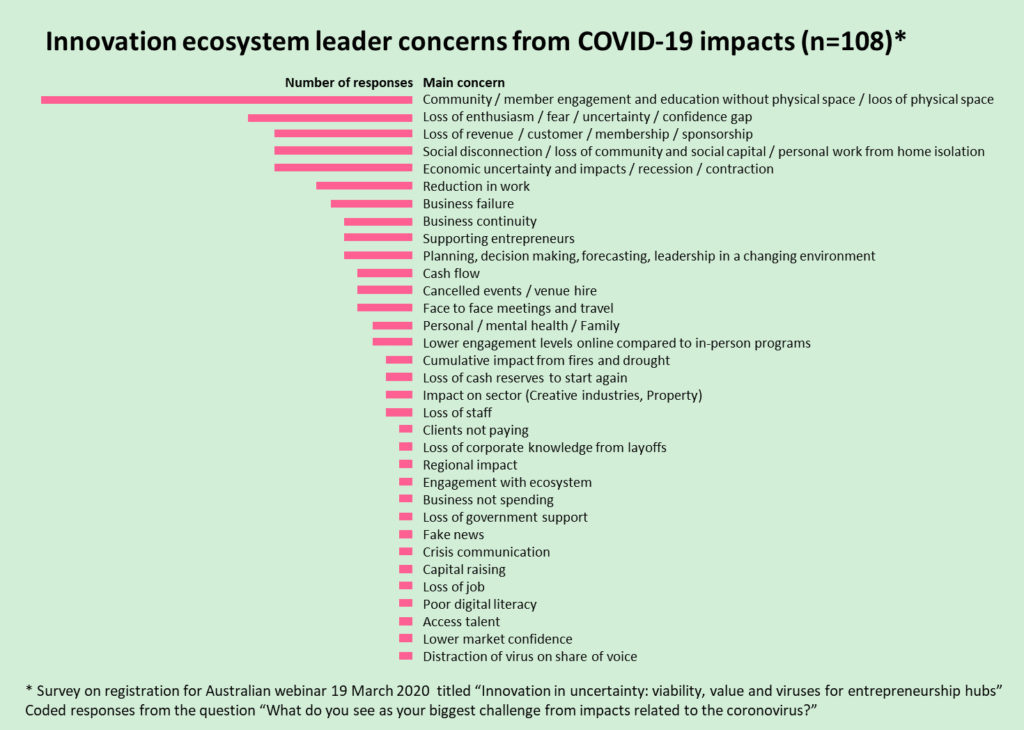
- Community / member engagement and education without physical space / loos of physical space
- Loss of enthusiasm / fear / uncertainty / confidence gap
- Loss of revenue / customer / membership / sponsorship
- Social disconnection / loss of community and social capital / personal work from home isolation
- Economic uncertainty and impacts / recession / contraction
- Reduction in work
- Business failure
- Business continuity
- Supporting entrepreneurs
- Planning, decision making, forecasting, leadership in a changing environment
- Cash flow
- Cancelled events / venue hire
- Face to face meetings and travel
- Personal / mental health / Family
- Lower engagement levels online compared to in-person programs
- Cumulative impact from fires and drought
- Loss of cash reserves to start again
- Impact on sector (Creative industries, Property)
- Loss of staff
- Clients not paying
- Loss of corporate knowledge from layoffs
- Regional impact
- Engagement with ecosystem
- Business not spending
- Loss of government support
- Fake news
- Crisis communication
- Capital raising
- Loss of job
- Poor digital literacy
- Access talent
- Lower market confidence
- Distraction of virus on share of voice
Opportunities
Stating the challenges above can help to normalise what we are going through. Whatever concerns you have are likely shared by many others. This is the same for opportunities.
Again, given the nature of the audience, the dominant opportunity related to taking services online and virtual. However, there are a range of statements that, if true, give hope in what will be a very challenging time.
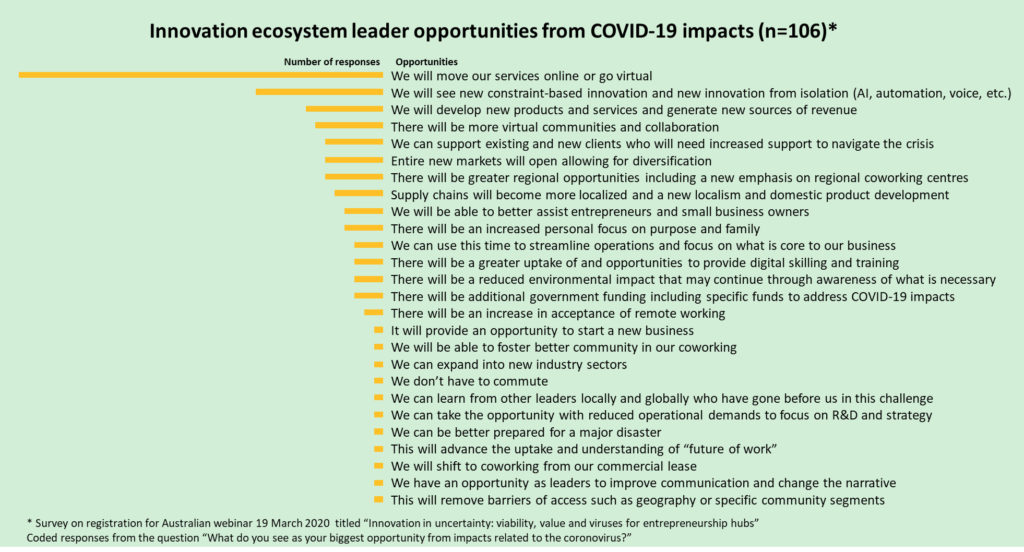
- We will move our services online or go virtual
- We will see new constraint-based innovation and new innovation from isolation (AI, automation, voice, etc.)
- We will develop new products and services and generate new sources of revenue
- There will be more virtual communities and collaboration
- We can support existing and new clients who will need increased support to navigate the crisis
- Entire new markets will open allowing for diversification
- There will be greater regional opportunities including a new emphasis on regional coworking centres
- Supply chains will become more localized and a new localism and domestic product development
- We will be able to better assist entrepreneurs and small business owners
- There will be an increased personal focus on purpose and family
- We can use this time to streamline operations and focus on what is core to our business
- There will be a greater uptake of and opportunities to provide digital skilling and training
- There will be a reduced environmental impact that may continue through awareness of what is necessary
- There will be additional government funding including specific funds to address COVID-19 impacts
- There will be an increase in acceptance of remote working
- It will provide an opportunity to start a new business
- We will be able to foster better community in our coworking
- We can expand into new industry sectors
- We don’t have to commute
- We can learn from other leaders locally and globally who have gone before us in this challenge
- We can take the opportunity with reduced operational demands to focus on R&D and strategy
- We can be better prepared for a major disaster
- This will advance the uptake and understanding of “future of work”
- We will shift to coworking from our commercial lease
- We have an opportunity as leaders to improve communication and change the narrative
- This will remove barriers of access such as geography or specific community segments
Next steps
The workshop was a success and we will be providing a more detailed write-up and next steps soon. The purpose of this report is to highlight that entrepreneur support organisations need to look after each other, our challenges and opportunities are shared, and that there is significant potential to build resilience as we work through the coming months.
The need for community and support also came through in the conversations and the feedback. To this end, we set up a Slack community for leaders in the Australian Innovation Community. We have had 160 new leaders join in the first day and connections, conversations, and support are already happening. Our aim in the experiment is to apply the feedback real-time and model what is being asked for by the community.
If you are involved in the innovation ecosystem, around the world, feedback on challenges and opportunities you see in the coming months are welcome as is feedback and contribution to this report.
If you are a leader in the Australian innovation system and want to join the Slack community, drop me a line with your email and we will get you an invite.
Many of us share the sense that there will be have challenging and unprecedented times ahead. We also know we can achieve more for a wider community if we do it together.
